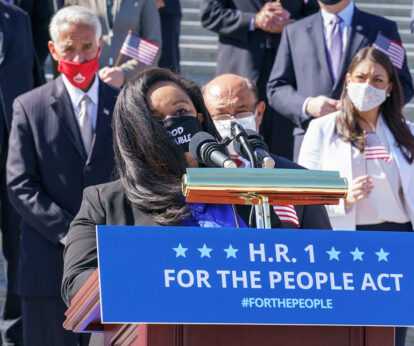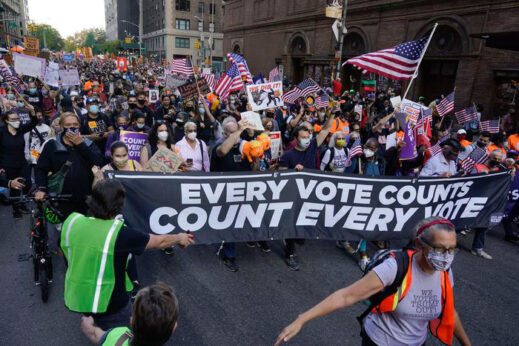
The Democratic-led House of Representatives is responding to the largest assault on voting rights since Reconstruction with the For the People Act (H.R. 1). The measure passed in the lower chamber on March 3. The fight to win final adoption of the bill now passes to the nearly evenly divided Senate.
But passage in the Senate of what is being called “America’s next great civil rights bill,” along with the John Lewis Voting Rights Act, will occur without Republican support. Making it law is going to require the mobilization of a highly energized mass labor and people’s movement and elimination or reform of another instrument historically used to block civil and voting rights—the Senate filibuster.
Democrats passed H.R. 1 amid the backdrop of Republicans in state capitols around the country enacting, with lightning speed, sweeping new voter suppression measures, mainly targeting Black and other voters of color. The GOP scorched earth assault on democracy is being committed under cover of “the big lie”—that Democrats and African American voters stole the 2020 elections with massive fraud.
Suppose the GOP succeeds in trampling growing resistance to these measures. In that case, they could set our fragile democracy back years and forcibly impose rule by a minority party that has abandoned all pretenses of democracy and which is dominated by the voices of its fascist-leaning wing.
Republicans want voting restrictions in place before the 2022 midterm elections. They know they cannot win and maintain power in a country undergoing rapid and widespread demographic and political shifts without restricting voting rights. When the masses of people vote, the Republican Party loses—and they know it.
African Americans, Mexican Americans, Puerto Ricans, Native Americans, other people of color, youth, and women are the GOP’s primary target for suppression. If they can be kept away from the polls or their votes can be invalidated in large numbers, then Republicans can effectively steal back the House and Senate seats they need to regain power.
Therefore, the nation has reached a democratic crossroads. Congress must pass two new landmark voting rights bills and eliminate or reform the filibuster to do so. At minimum, they will have to create a “cutout” of the filibuster for civil and voting rights legislation to win resistant Democratic senators, namely West Virginia’s Joe Manchin and Arizona’s Kyrsten.
Democrats risk losing their Congressional majorities in 2022 and the presidency in 2024 if they don’t block this assault on voting rights. Furthermore, they and their mass democratic allies will lose any hopes for large-scale transformative economic and political changes ushered in by the 2020 election victory. They include addressing the climate emergency and racial, gender, and wealth inequality; passing the $15 minimum wage, the Pro-Act, U.S. Citizenship Act, Equality Act, student debt cancellation, or D.C. Statehood; and other radical democratic reforms, and more. If there isn’t much to show for two (or four) years in power, Democratic candidates will face major problems mobilizing support at election time.
Maintenance of the undemocratic filibuster rule effectively allows 41 GOP Senators representing 21% of the people to obstruct all legislation and enable the minority to block the majority from gaining and exercising power. Inaction on the filibuster is a recipe for disaster.
Avalanche of voter suppression
GOP legislators are now acting on at least 253 new bills to restrict voting in 43 states—and that is on top of the extreme partisan gerrymandering they’re engineering. Combined, they could block so-called red states from going blue (like Georgia did in 2020) and lock in GOP control of state legislatures and the U.S. House of Representatives for years to come. The bills being rushed into law roll back or eliminate automatic voter registration and no-excuse mail-in ballots, shorten early voting periods, add more stringent I.D. requirements, and eliminate Sunday voting. All these provisions were critical to boosting voter turnout in 2020.

Georgia is ground zero for the assault, particularly on African-American voters. The GOP is apoplectic that Biden and Democratic Senators Raphael Warnock and Jon Ossoff won there and that the very voters the GOP had historically disenfranchised were decisive to the victory. They are determined that another Republican state doesn’t become the next Georgia.
But in their blind fury, Republican legislators are ramming through voting restrictions that will hurt even their own voters. Up until the Jan. 5 U.S. Senate runoff, the GOP dominated early voting in the state. In the 2020 elections, 1.3 million Georgia voters exercised no-excuse vote by mail, including 450,000 GOP voters. Now, after losing, the party is suddenly against it. The new law would make Georgia the most restrictive state in the country on mail-in ballots.
A companion Senate bill ends Sunday voting, a day during which African American churches traditionally organize “Souls to the Polls” turnout events. Black voters are 30% of the Georgia electorate overall, but they make up 37% of Sunday voters. “This bill is Jim Crow with a suit and tie,” said Aunna Dennis of Georgia Common Cause.
Another bill changes rules for special elections like the one won by Ossoff and Warnock. The runoff was designed during the Jim Crow era to prevent African Americans from being elected to statewide office. But once two Democrats won, significant changes were suddenly needed. The legislation shortens the election period from nine weeks to only four, cuts early voting to five days, and prevents new voters from registering for a runoff, even if they have turned 18 since the time of the general election.
Gutting the Voting Rights Act
Also, at stake is what’s left of the landmark 1965 Voting Rights Act. On March 2, the U.S. Supreme Court heard oral arguments challenging Section 2 of the VRA involving two laws passed by Arizona’s Republican-dominated legislature. Section 2 “targets policies and practices that impede the ability of communities of color to elect the candidates of their choices,” said Myrna Perez of the Brennan Center for Justice.
One law bans out-of-precinct voting, effectively ordering election workers to throw away the ballots of anyone who accidentally went to the wrong polling place or whose address changed. The other makes it a crime for campaign workers, community activists, and others to collect ballots for delivery to polling places. The laws are “surgically targeted” to lower the turnout of people of color, including Native American voters who were decisive to Biden’s victory in the state.
The Voting Rights Act was severely weakened in 2013 when right-wing justices on the Supreme Court struck down Section 5, which had mandated pre-clearance by the Justice Department for any voting changes in the Shelby v. Holder decision. The ink wasn’t even dry on the ruling before states began passing a rash of voter suppression laws.
If the court, as expected, with a larger right-wing majority after Trump’s appointments, strikes down Section 2, all challenges to discrimination in voting would be eliminated, rendering the VRA virtually meaningless.
The intent of Republicans couldn’t have been more blatant, which didn’t bother the right-wing justices in the least. “Justice (Amy Coney) Barrett asks GOP lawyer Michael Carvin, ‘Why is the RNC in this case?’ Carvin admits striking down restrictions on voting ‘puts us at a competitive disadvantage relative to Democrats.’ Another example of Republicans saying the quiet part out loud,” tweeted Ari Berman.
The next great Civil Rights bill
The answer to this multi-sided assault on democracy begins with the passage of landmark voting rights legislation and the filibuster’s elimination, a relic of the Jim Crow era. Only federal legislation will trump whatever the GOP and SCOTUS are destroying.

The Brennan Center for Justice calls the For the People Act “America’s next great Civil Rights bill,” and “a roadmap to an inclusive, diverse, and equitable democracy.” It sets minimum standards for “all states to provide online, automatic, and same-day registration; ensure at least 15 days of in-person early voting; provide all voters with access to no-excuse, postage-free absentee ballots; and offer drop boxes where they can return those ballots.” The bill also ends “gerrymandering by requiring every state to create independent commissions for congressional redistricting and by defining national criteria to govern the process.”
The John Lewis Voting Rights Act would shore up the 1965 VRA by restoring pre-clearance provisions gutted by the Shelby ruling. States would have to get authorization before making any changes to election practices in racially diverse areas, changes in the documents required to vote or register, and any plans to change voting access based on language. Reducing polling locations in racially diverse municipalities and districts would also require pre-clearance.
The extreme right wing and its powerful propaganda machine are on a major campaign to block both bills, which enjoy 68% public support, including among 57% of Republicans. The campaign aims to flip Republican support to opposition.
The road to transformative democratic change starts with the passage of voting rights legislation and the filibuster’s elimination. The broad anti-right alliance that united to oust Trump and the GOP in the 2020 elections is once again essential to winning these pivotal struggles. They are the first but absolutely crucial steps on the long road to more fundamental changes for a future multi-racial radical political and economic democracy.










